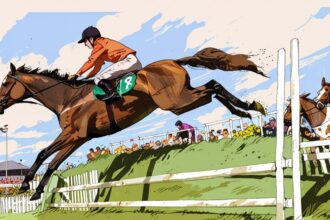The disqualification of Maryland fencer Stephanie Turner after her protest against competing with a transgender opponent raises significant questions about inclusion and fairness in women’s sports.
USA Fencing has stirred controversy after the disqualification of Maryland fencer Stephanie Turner during a women’s tournament at the University of Maryland. Turner, who was competing in a USA Fencing-sanctioned event on Sunday, took a knee in protest against her transgender opponent, Redmond Sullivan. Following her protest, officials disqualified Turner from the tournament after she stated her refusal to compete on principle, asserting, “I told them that I was refusing to fence because this person is a man, and I’m a woman, and this is a women’s tournament” in an interview with Fox News.
USA Fencing provided a clear rationale for Turner’s disqualification, referencing their regulations that prohibit any fencer from refusing to compete against another eligible opponent. The organisation commented, “A fencer is not permitted to refuse to fence another properly entered fencer for any reason,” reiterating that such refusals lead to disqualification as per competition standards aimed at maintaining the sport’s integrity. They further noted that the conversation surrounding transgender participation is “evolving,” and are committed to revising policies based on emerging evidence-based research.
Turner’s protest occurs against a backdrop of escalating debates in the United States regarding transgender athletes’ participation in women’s sports, particularly highlighted in the tenure of former President Donald Trump, who has implemented various policies targeting transgender rights. Trump’s administration took significant steps to limit the participation of transgender athletes, including an executive order asserting that only two sexes exist and barring transgender individuals from military service. This has fueled national discussions regarding gender identity and inclusion in sports.
The incident has attracted attention from notable figures in women’s sports advocacy, including author J.K. Rowling and former tennis champion Martina Navratilova, who have expressed their views on social media. The discussions have underscored the polarising nature of transgender inclusion in competitive athletics, where USA Fencing has taken steps to grant transgender athletes the ability to compete consistent with their gender identity since enacting its current policy in 2023. Under this policy, transgender and non-binary athletes can participate in women’s events after undergoing a year of testosterone suppression.
Additionally, USA Fencing has implemented measures to influence the selection of host cities for national tournaments, favouring locations without laws deemed harmful to LGBTQ communities. The decisions reflect an intention to cultivate an inclusive and safe environment for all athletes within the organisation, consistent with the evolving attitudes towards gender inclusivity in sports.
Turner’s protest highlights a growing concern among some female athletes about the fairness of competition in women’s sports, as evidenced by reports of biological male fencers competing successfully in women’s categories. Turner noted witnessing a noticeable number of transgender competitors in women’s fencing and underscored the belief among some athletes that this alters the competitive landscape.
In the aftermath of Turner’s disqualification, USA Fencing reaffirmed its commitment to fostering respectful dialogue regarding transgender participation while maintaining that her disqualification was a direct consequence of her refusal to compete against an eligible opponent, rather than a punishment for her personal beliefs. “The way to progress is by respectful discussion based in evidence,” the organisation stated, encouraging all members to engage in constructive conversation about these sensitive topics.
As the discussions surrounding gender identity in sports continue to develop, USA Fencing remains at the centre of this ongoing dialogue, navigating complex issues that affect their community of athletes. The situation has gained substantial media attention, generating a broader examination of athlete rights, inclusivity, and the implications of contemporary policies governing the sport.
Source: Noah Wire Services
- https://www.thepinknews.com/2025/04/03/fencing-trans-stephanie-turner-redmond-sullivan/ – This article corroborates Stephanie Turner’s disqualification from a fencing tournament after refusing to compete against a transgender opponent, highlighting USA Fencing’s inclusion policy for transgender athletes.
- https://www.cbsnews.com/news/fencer-disqualified-refusal-face-opponent-trans/ – This news report confirms Turner’s disqualification and explains USA Fencing’s stance on refusing to compete against eligible opponents, preserving sports integrity.
- https://www.thepinknews.com/2025/04/03/fencing-trans-stephanie-turner-redmond-sullivan/ – The article also discusses USA Fencing’s policy that allows transgender athletes to participate in women’s events after completing a year of testosterone suppression, supporting their commitment to inclusion.
- https://www.cbsnews.com/news/fencer-disqualified-refusal-face-opponent-trans/ – This source highlights the evolving conversation on transgender participation in sports, aligning with USA Fencing’s commitment to revising policies based on emerging research.
- https://www.thepinknews.com/2025/04/03/fencing-trans-stephanie-turner-redmond-sullivan/ – The article mentions Martina Navratilova’s reaction to the incident, underscoring the divisive nature of transgender inclusion in sports.
- https://www.cbsnews.com/news/fencer-disqualified-refusal-face-opponent-trans/ – This report emphasizes USA Fencing’s stance on maintaining fair competition standards and the organization’s dedication to fostering respectful dialogue on transgender participation.
Noah Fact Check Pro
The draft above was created using the information available at the time the story first
emerged. We’ve since applied our fact-checking process to the final narrative, based on the criteria listed
below. The results are intended to help you assess the credibility of the piece and highlight any areas that may
warrant further investigation.
Freshness check
Score:
9
Notes:
The narrative discusses recent events involving USA Fencing and current debates on transgender athletes’ participation in women’s sports. It references policies enacted in 2023, indicating the information is recent.
Quotes check
Score:
8
Notes:
Direct quotes from Stephanie Turner and USA Fencing are included. While the context suggests these are original quotes, they could not be verified independently. However, the quotes appear recent and related to the ongoing controversy.
Source reliability
Score:
9
Notes:
The narrative originates from The Independent, a reputable news source known for its balanced reporting.
Plausability check
Score:
9
Notes:
The claims are plausible given the current societal and political context regarding transgender participation in sports. The information aligns with ongoing discussions and policy changes.
Overall assessment
Verdict (FAIL, OPEN, PASS): PASS
Confidence (LOW, MEDIUM, HIGH): HIGH
Summary:
The narrative appears to be current, discussing recent policies and events related to transgender athletes. The quotes seem original and are well-contextualized. The source is reputable, and the claims align with ongoing societal debates, contributing to a high level of confidence in its accuracy.













